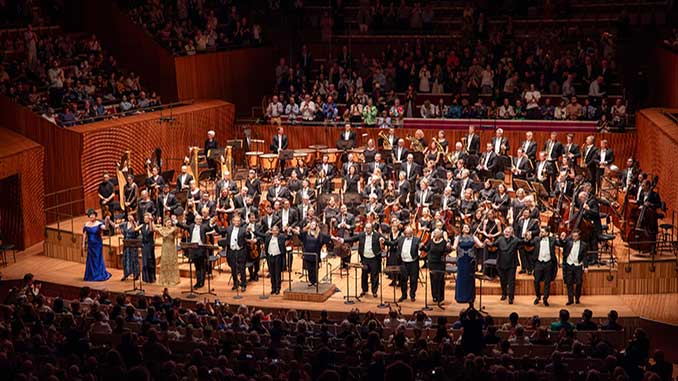 In recent years Australia’s enthusiasm for Richard Wagner’s sprawling dramatic works has been exemplified by regular performances of both fully staged and concert performances with Wagnerites around the country lapping them up.
In recent years Australia’s enthusiasm for Richard Wagner’s sprawling dramatic works has been exemplified by regular performances of both fully staged and concert performances with Wagnerites around the country lapping them up.
Three fully staged productions of his epic four-part Der Ring des Nibelungen have been mounted since Adelaide’s highly-praised production in 1998. A fourth, Opera Australia’s new, much anticipated and twice postponed ‘digital’ Ring is in final rehearsals in Brisbane.
And now, the Sydney Symphony Orchestra (SSO) are keeping the bellows blowing with a multi-year Ring project – repeating an undertaking of each of the Ring operas as they did under conducted by Edo de Waart between 1996 and 2000 – that will have local Wagner ‘Ringnuts’ talking for years.
On Thursday evening, the first instalment, Das Rheingold, signalled a rapturous beginning. Current SSO Chief Conductor Simone Young pulled off a stunner! Young’s understanding of and insight into Wagner and German repertoire has deepened considerably over several decades, in that time having conducted much acclaimed complete Ring Cycles in Vienna, Berlin and in Hamburg.
The Ring’s “preliminary evening”, Das Rheingold presents a macro view of events that drive the main dramas of the cycle, precipitated by Alberich’s renunciation of love and theft of the Rheinmaidens’ gold, forging a ring whose wearer can rule the world.
In concert version, Young could not have presided over a better dramatised performance, despite a stage-filling, superbly pumped SSO leaving little but a slither for soloists to show their mettle (one giant almost knocked a music stand flying on passing to the exit).
There was always a clear sense that Young’s reach extended to every minuscule detail well beyond her meticulously crafted musical interpretation, including a reach to every musician’s heart.
That was the beauty of seeing Das Rheingold in concert and a chance to marvel at the intricate workings of something like a Swiss watch with an orchestra so perfectly aligned. Young’s incisive conducting with neatly judged tempi and fresh, bristling textures supported the soloists splendidly.
The work’s instantly settling and immersive opening purred with an uncommonly heard auspiciousness – incredibly under an initial blackout until bluish light seeped through the concert hall. The orchestral clarity accompanying the Rhinemaidens’ lighthearted playfulness expanded on Young’s descriptive, painterly approach.
From the delicate touches employed for the eerily hushed tarnhelm leitmotif as Alberich flaunts his transformative abilities to the magnificent stormy brew bringing to mind thick Van Gogh-like strokes before Donner clears the skies, Young’s reading brought imagery to the fore all the way through to the radiant majesty as the gods entered Valhalla.
That seemed particularly fitting given the absence of sets and costumes. Small theatrical gestures nevertheless created atmospheric appeal, namely by an apt lighting design that bathed the hall in an assortment of moods until a finale incorporating sequential colours of the rainbow.
But it was Young’s trusted, hand-picked soloists, many of whom have worked closely with her in Europe, who made sure every mood and message was to be heard and felt.
As a mighty-voiced, authoritatively solid but notably anxiously tinted Wotan, German bass-baritone Wolfgang Koch dug deep to get his audience barracking for his character’s commanding yet questionable ways with an intelligently considered vocal armoury.
German mezzo-soprano Michaela Schuster’s stood at his side in riveting ardent voice – appreciatively unafraid to mine the dramatic extremes – as a fully mindful and unfettered Fricka, Wotan’s wife.
As the sardonic and mercurial god of fire, Loge, Vienna-based Australian-Malaysian Steve Davislim was excellent as he skittered engagingly and sung confidently with charm and fluidity.
And while it was as if the seas parted when magnificent contralto Noa Beinart entered as a richly faceted, time-stopping Erda to warn Wotan of the consequences of greed, it was the expressively charged German bass-baritone Falk Struckmann who really left the greatest impression, nailing a dangerously gripping Alberich and delivering a curse that chilled like no other in a concert highlight.
Other memorable performances came from penetrating soprano Eleanor Lyons as the ransomed and dragged Freia, Simon Meadows and Jud Arthur as the brutish unsmiling giants contracted to build Wotan’s Valhalla, Fasolt and Fafner, and tenor Andrew Goodwin as the subjugated and trembling Mime, sporting vocal artistry to match.
A cordial sense of spirit accompanied Simon O’Neill’s nimble-voiced Froh and Samuel Dundas whipped up a powerful portrayal of Donner.
As frolicking luxury-cast Rhinemaidens opening the epic and lamenting their loss at part one’s conclusion with their harmonised song wafting through the hall’s side doors with harpist Louise Johnson’s notes, Samantha Clarke (Woglinde), Catherine Carby (Wellgunde) and Margaret Plummer (Flosshilde) created an evocative trio.
A row upon row standing ovation certainly sent a signal to the stage just how impactful Young’s leadership over a 100-plus contingent of artists, giving everything they had, was. Die Walküre follows this time next year with senses eager for and confidence high in Young’s choices and interpretation.
Das Rheingold
Concert Hall – Sydney Opera House, Bennelong Point (Sydney)
Performance: Thursday 16 November 2023
Information: www.sydneysymphony.com
Image: Sydney Symphony Orchestra presents Das Rheingold – photo by Daniel Boud
Review: Paul Selar
